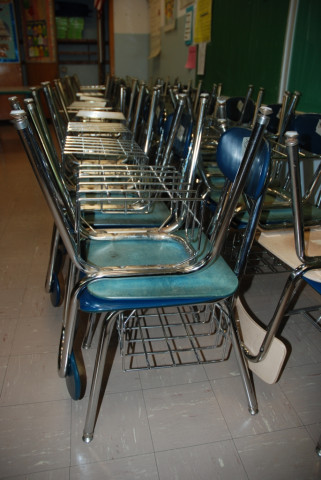Subject[ive] studies: After a call to prayer in Torghar, a sermon on girls education
Pressure from religious leaders causes over 40 students grades 5 to 8 to drop out of district’s sole private school.

Pressure from religious leaders caused over 40 students of grades 5 to 8 to drop out of district’s sole private school. PHOTO: FILE
Some girls in Pakistan hit the glass ceiling at grade 4 — the end of primary school.
In Judba, the headquarters of Torghar district, this has happened because there are no schools exclusively for girls beyond a certain age. The government does not run any middle and secondary schools for girls, which is why those who finish primary school (grade 4) have only one choice: private school.
And that private school, the only one in Judba, just lost 60 of its students because their parents pulled them out after tribal elders objected to coeducation and non-female teachers.
Villagers told The Express Tribune on Friday that a few days ago some tribal leaders reportedly belonging to the Jamiat Ulema-e-Islam-Fazl had criticised parents during sermons at mosques and other public venues for sending their daughters to this one private school. They had argued that coeducation for children after a certain age was against (what they interpreted as) tribal and Islamic customs.
“Some prayer leaders have objected to sending girls to the private school offering coeducation after grade five,” said Siraj Muhammad Khan, who is the chairman of the district Zakat committee. He did not name any of the prayer leaders. He did confirm, however, that around five dozen girls have been forced to stay home. The private school’s principal was not immediately available for comment. However, one of the teachers also confirmed that over 40 girls from grades five to seven had dropped out.
In the sermons and public announcements the parents were pressed to keep their daughters away from this specific institution. And so, after these verbal decrees were issued, the parents had asked the school to strike their names off the register.
Siraj Muhammad Khan said those who have opposed schooling for the girls justified their stance by claiming that the private school was located in the middle of Judba bazaar which the girls have to pass through. They were also against children sitting together in the same class and the choice of teacher.
What these prayer leaders did not factor in is a shortage of women teachers in the area which has an abysmal literacy rate. “If we hire women teachers from Battagram and Mansehra they are faced with housing problems,” explained a teacher from the private school. Indeed, Torghar is part of a region where women were not allowed to cast a single vote in the May 2013 general elections. The district acquired the status of a settled one only as recently as 2010. Prior to this it was part of a Frontier Region known as Kala Dhaka.
When this crisis emerged, men such as the district coordinator for the Human Rights Commission of Pakistan (HRCP) Zahid Khan tried to negotiate a solution. “We offered them [the leaders] to send our daughters to school in a burqa but they stuck to their [point], opposing education for girls beyond fifth grade,” said Khan. According to him, although tribal customs are still respected in the region, a majority of people are equally aware of the importance of education for girls. But residents are stuck between a rock and hard place as they do not want to go up against the influential men in the area. “But I am not scared of anyone and am committed to sending my daughters to the same school, come what may,” he added.
What is not clear, however, is why all of a sudden certain prayer leaders decided to focus on this one private school. A social activist from the area who requested not to be named has one theory: “There are some influential [clerical] leaders running private seminaries that offer religious and school education up to the primary level. They are behind this entire move.” He argued that if they really cared about the safety of girls they should use their funds to set up high schools and colleges for them rather than forcing them to study at their seminaries. As it is, there are very few girls who reach matric (grade 10), and even they have to go all the way to the neighbouring Battagram district to sit their exams. Additionally, if they want to sit the exam, they have to do as private candidates because they are not enrolled in any institution as is generally the case.
The HRCP’s Zahid has brought the matter to the notice of the deputy commissioner and the district education officer and suggested they upgrade one of the four primary schools for girls in Judba to middle and secondary level so the girls would not be denied their constitutional as well Islamic right to education. There is just one government middle school for girls in the entire district but it is located in the far-flung area of Maira Madakhel in Judba. For whatever it is worth, education official Wazir Alam said they were already considering upgrading some of the girls schools. Torghar District Education Officer Gohar Ali was not available for comment.
Published in The Express Tribune, March 16th, 2014.












COMMENTS
Comments are moderated and generally will be posted if they are on-topic and not abusive.
For more information, please see our Comments FAQ